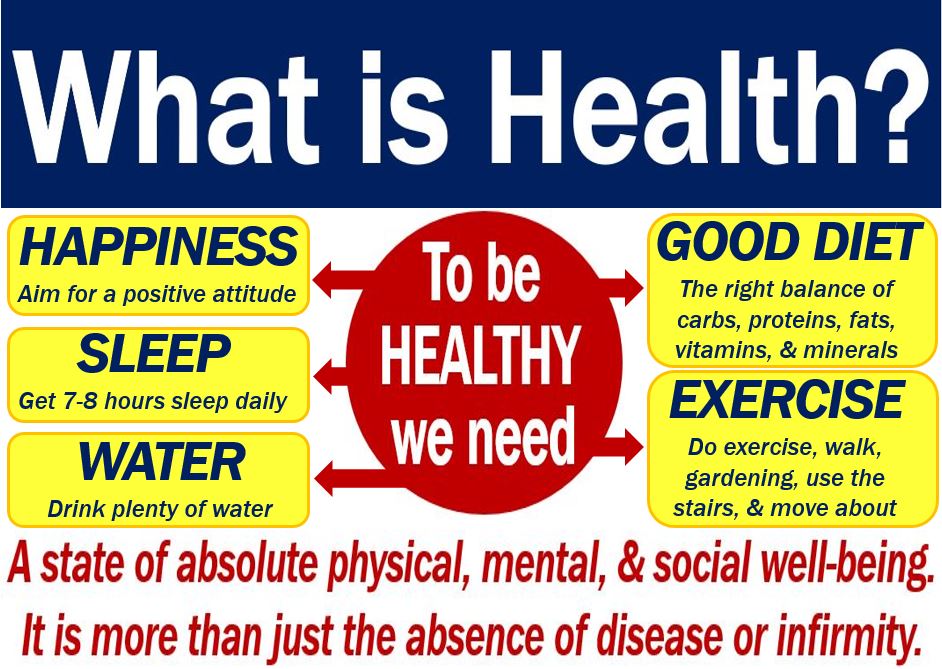Health is the state in which our bodies are free of illness. It also relates to a state of physical, mental, and social well-being. In other words, if I am healthy, it is more than just the absence of diseases or infirmity. Likewise, we can use the term to denote a condition within societies and countries. In fact, even businesses can enjoy health or suffer from a lack of it. For example, a country’s economic and a business’ financial health.
Journalists often write about a how healthy people, economies, and companies are.
WHO is a United Nations specialized agency dedicated to international public health. It has existed since 1948 and has 194 Member states.
Types of health
There are many areas that define health. However, for better diagnosis, it is important to consider it as part of a whole.
Physical Health
When we say that a person is physically healthy or unhealthy, we are referring to their body.
How physically healthy you are has to do with what you sense, i.e., what and how you feel.
When we are not physically healthy, we may present symptoms or signs. For example, we might experience a headache or develop a swelling.
Symptoms are things we sense and describe to other people, such as our doctor. Signs, on the other hand, are things that other people such as a doctor can detect.
For example, a headache is a symptom. Only the patient knows whether a headache is present. However, people other than the patient can detect a swelling.

Mental and emotional health
How healthy we are mentally is closely related to how healthy we are emotionally. They are all about the condition and state of the person’s mind. Monitoring our mental and emotional well-being is important.
It is important because it is considerably harder to detect or notice the signs and symptoms of mental or emotional problems.
For example, the warning signs of a broken leg are much more evident than those of mild depression or PTSD. PTSD stands for Post Traumatic Stress Disorder.
Health – a broad term
Like the word well-being, health is a very broad term.
If you aim to be and remain healthy, you should:
Diet
Have a healthy and balanced diet. Good food helps prevent heart problems, strokes, diabetes type 2, etc. Eating properly also helps maintain the right body-weight.
Physical activity
Exercise regularly. It helps keep you both physically and mentally healthy. It also helps prevent obesity or overweight.
In fact, studies have shown that physically active people tend to enjoy better quality sleep than their relatively inactive counterparts.
Sunlight – pros and cons
Get some sun. This helps maintain healthy vitamin D levels. However, do not overdo it. Too much sun exposure significantly raises your risk of developing skin cancer.
Some sunscreens protect your skin if you are going to be outdoors on a sunny day for a long time.
Smoking
Give up smoking or never start if you don’t smoke. Smoking not only raises the risk of lung cancer but also of dozens of other diseases.
Smokers are much more likely to develop COPD, other respiratory problems, heart disease, and stroke. COPD stands for Chronic Obstructive Pulmonary Disease.
Studies over the past half century have shown that on average regular smokers have shorter lifespans than non-smokers.
Alcohol
Never drink alcohol excessively. Alcohol abuse not only makes it more likely that you develop fatal diseases, but it is also dangerous.
An alarming percentage of fatal car accidents occurred because the drivers were drunk.
Regular checkups
Check your health regularly. This means having regular physical checkups. Also, dental care is extremely important.
Unhealthy gums raise the risk of developing heart problems, studies have shown.
The term health-care refers to medical professionals, hospitals, clinics, and other entities that try to keep us healthy.
